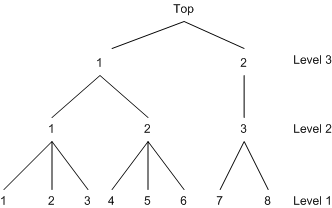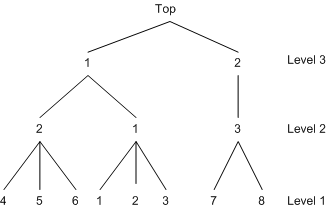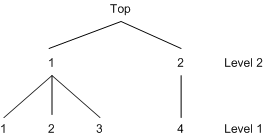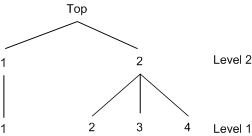The MDC Procedure
The NEST statement is used when one choice variable contains all possible alternatives and the TYPE=NLOGIT option is specified. The decision tree is constructed based on the NEST statement. When the choice set is specified using multiple CHOICE= variables in the MODEL statement, the NEST statement is ignored.
Consider the following eight choices that are nested in a three-level tree structure.
Level 1 Level 2 Level 3 top
1 1 1 1
2 1 1 1
3 1 1 1
4 2 1 1
5 2 1 1
6 2 1 1
7 3 2 1
8 3 2 1
You can use the following NEST statement to specify the tree structure displayed in Figure 18.22:
nest level(1) = (1 2 3 @ 1, 4 5 6 @ 2, 7 8 @ 3),
level(2) = (1 2 @ 1, 3 @ 2),
level(3) = (1 2 @ 1);
Note that the decision tree is constructed based on the sequence of first-level choice set specification. Therefore, specifying another order at Level 1 builds a different tree. The following NEST statement builds the tree displayed in Figure 18.23:
nest level(1) = (4 5 6 @ 2, 1 2 3 @ 1, 7 8 @ 3),
level(2) = (1 2 @ 1, 3 @ 2),
level(3) = (1 2 @ 1);
However, the NEST statement with a different sequence of choice specification at higher levels builds the same tree as displayed in Figure 18.22 if the sequence at the first level is the same:
nest level(1) = (1 2 3 @ 1, 4 5 6 @ 2, 7 8 @ 3),
level(2) = (3 @ 2, 1 2 @ 1),
level(3) = (1 2 @ 1);
The following specifications are equivalent:
nest level(2) = (3 @ 2, 1 2 @ 1) nest level(2) = (3 @ 2, 1 @ 1, 2 @ 1) nest level(2) = (1 @ 1, 2 @ 1, 3 @ 2)
Since the MDC procedure contains multiple cases for each individual, it is important to keep the data sequence in the proper
order. Consider the four-choice multinomial model with one explanatory variable cost:
pid choice y cost
1 1 1 10
1 2 0 25
1 3 0 20
1 4 0 30
2 1 0 15
2 2 0 22
2 3 1 16
2 4 0 25
The order of data needs to correspond to the value of choice. Therefore, the following data set is equivalent to the preceding data:
pid choice y cost
1 2 0 25
1 3 0 20
1 1 1 10
1 4 0 30
2 3 1 16
2 4 0 25
2 1 0 15
2 2 0 22
The two-level nested model is estimated with a NEST statement, as follows:
proc mdc data=one type=nlogit;
model y = cost / choice=(choice);
id pid;
utility(1,) = cost;
nest level(1) = (1 2 3 @ 1, 4 @ 2),
level(2) = (1 2 @ 1);
run;
The tree is constructed as in Figure 18.24.
Another model is estimated if you specify the decision tree as in Figure 18.25. The different nested tree structure is specified in the following SAS statements:
proc mdc data=one type=nlogit;
model y = cost / choice=(choice);
id pid;
utility u(1,) = cost;
nest level(1) = (1 @ 1, 2 3 4 @ 2),
level(2) = (1 2 @ 1);
run;



